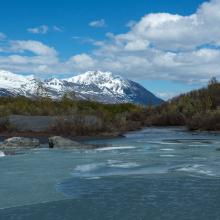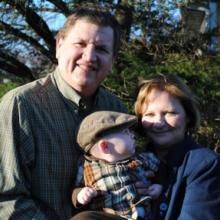Environment
The Vatican is set to host a major conference on climate change this month that will feature leading researchers on global warming and an opening address by U.N. Secretary-General Ban Ki-moon.
The meeting, which the Vatican detailed on its website late on April 14, is another sign of Pope Francis’ “green agenda” and another potential red flag for conservatives who are already alarmed over an expected papal teaching document on the environment that is scheduled for release this summer.
The one-day summit on April 28 will also include participants from major world religions and aims to “elevate the debate on the moral dimensions of protecting the environment in advance of the papal encyclical,” as the papal document is known.
Another goal, says a statement on a Vatican website, is to highlight “the intrinsic connection between respect for the environment and respect for people — especially the poor, the excluded, victims of human trafficking and modern slavery, children, and future generations.”
“An individual who breaks a law that conscience tells him is unjust, and who willingly accepts the penalty of imprisonment in order to arouse the conscience of the community over its injustice, is in reality expressing the highest respect for the law” —Martin Luther King, Jr.
Last year on a crisp afternoon in March, I was one of nine people arrested by the NYPD and taken away to the local precinct for processing. My crime? Attempting to plant detoxifying sunflowers on public brownfield land on the South Bronx waterfront in New York City.
Earlier in the day, more than 100 residents, faith leaders, organizations, friends, and allies came together to protest the proposed relocation of the online grocer FreshDirect to a residential neighborhood in the South Bronx. After a jubilant and joyous interfaith reflection and prayer vigil outside the entrance to the waterfront location, security guards refused to let us cross the gate, so we sat in front of it in protest — a peaceful and non violent act of civil disobedience.
Our coalition, South Bronx Unite, works to improve and protect the social, environmental, and economic future of the South Bronx in New York City, located in the poorest congressional district in the country. For three years we have been fighting to stop FreshDirect from receiving more than $100 million in subsidies and incentives to build a diesel trucking distribution center on public land along the Bronx Kill Waterfront.
Editor's Note: In this latest edition of our “Disinvest/Reinvest” series, John Elwood reflects on how – and why – he divested from fossil fuels. You can sign up for the final week of our Christian Divestment e-course here.
Investments shape souls. Jesus tells us so.
“For where your treasure is, there your heart will be also.” Matthew 6:21
Over the years, these words of Jesus have kept me away from the “merchants of death” and conflict minerals and steered me toward ethical products of many sorts. In recent years, however, a more sinister and pervasive threat has come into focus. Climate scientists in 2014 warned that energy companies like Exxon, Shell, PetroChina and Chevron – which derive their value from enormous reserves of recoverable fossil fuels – will have to leave about 80 percent of those precious reserves in the ground if the world is to have a chance of avoiding global climate mayhem.
That means that four out of every five barrels of oil, or tons of coal, or cubic feet of natural gas that these companies have discovered and developed must eventually be written off.
The market value of fossil fuel reserves today is valued at around $27 trillion, a sum that dwarfs the famous U.S. national debt. This means that there is a very, very bad day of reckoning ahead for someone. Either all of humanity will endure unspeakable suffering, or those who invest in the fossil-fuel companies will suffer huge losses.
It became clear to me that investing in fossil fuels is no longer a retirement strategy or a way of mitigating market risks. It is a decision whether to align my soul with unfathomable harm to virtually all of humanity and to all of God’s beloved creation. If I’ve got my own personal slice of those carbon reserves (whether by buying a share of ExxonMobil or by investing in a mutual fund that does), I make money, or avoid big losses, only if the entire creation groans and suffers under the weight of climate calamity.
Recently President Obama proposed giving wilderness status to 12 million acres of the Artic National Wildlife Refuge.
Many Republican senators, including Alaska Sen. Lisa Murkowski, strongly oppose the president’s proposal. Much of the opposition is expressed as frustration and outrage that the president is hindering Alaskans from having control over their economic future. Sen. Murkowski asserts:
What’s coming is a stunning attack on our sovereignty and our ability to develop a strong economy that allows us, our children and our grandchildren to thrive. … It’s clear this administration does not care about us, and sees us as nothing but a territory. … I cannot understand why this administration is willing to negotiate with Iran, but not Alaska. But we will not be run over like this. We will fight back with every resource at our disposal.
The ANWR is home to significant untapped petroleum reserves that lie beneath the land the president is seeking to protect. This fight between protecting the ANWR and promoting economic growth and development through oil drilling is one that has been going on between Democrats and Republicans for years.
Alaska Gov. Bill Walker said in a statement he may be forced to accelerate oil and gas permitting on state lands to compensate for the new federal restrictions.
While I believe I understand the arguments made by advocates on both sides, it seems to me there is a fundamental ideological (and possibly theological) premise that often goes unacknowledged in these debates.
We’re a few weeks into 2015, which means many of us are striving to keep our New Year’s resolutions while others have already seen their best intentions collapse under the pressure of daily routines. Every year, we make promises to be better — we’ll go to the gym, save more money, slow down. But for Christians, every day is an opportunity to make resolutions. We call that repentance.
And this year — today — I am repenting of my dependence on fossil fuels.
While many associate repentance with sorrow or guilt, the biblical meaning of the word is to stop, turn around and go in a whole new direction. Repentance means changing our course and embarking on a new path.
For Christians, humanity’s failure to care for God’s creation warrants our repentance. This is not just a theological claim but a practical moral imperative when it comes to fossil fuel consumption. American Christians need to repent — and quickly!
Our society’s addiction to fossil fuels has had an unconscionable impact on the state of our Earth and on future generations. Coal-fired power plants are giving people cancer and asthma. Oil pipelines are spilling and destroying sacred lands. Natural gas fracking waste is leaking underground, threatening water sources. Through our consumption of coal, oil, and gas, we have enabled this toxic activity.
In November, when the Senate just barely failed to pass a bill approving TransCanada’s controversial Keystone XL tar sands pipeline, Sen. Mitch McConnell (R-Ky.) interrupted the debate that followed it to tell everyone that we hadn’t seen the last of Keystone XL. He vowed that a new bill authorizing the pipeline would be the first thing on President Obama’s desk in the next session of Congress.
Sen. McConnell is making good on that promise – with another upcoming vote, he says he has the 60 votes he’ll need to pass the pipeline, which the GOP has branded as a “jobs creation” bill with dubious claims about job numbers.
But White House Press Secretary Josh Earnest announced today that “If this bill passes this Congress the president, wouldn't sign it.” This promise of a veto may have less to do with the environmental implications of the pipeline, the violation of a treaty with American Indians, or the years of steady protest from vocal opponents, and more to do with giving the State Department time to finish their review process. Regardless, it’s another stalled start for the would-be Keystone XL pipeline.
The White House needs to hear from Christians who oppose the Keystone XL pipeline. Click here to send a tweet to President Obama!
Like sifted coal, the dust is settling after the recent election in the “War On Coal” zone in West Virginia and Kentucky. Ungloved fisted hands lifted high in victory, King Coal. Knocked out cold on the canvas, contenders misleadingly accused of having President Obama and his dreaded coal-killing EPA in their corner.
The campaign propaganda was drearily repetitive. The syllogistic script for Republicans, “My opponent is a Democrat. President Obama is a Democrat whose EPA is killing coal jobs. Therefore my opponent will kill your coal jobs.” Democrat candidates protested vigorously, “As top priority, we will fight to bring the EPA to its knees, and bring coal jobs back!”
It’s been decades since any semblance of a coal boom economy. Comparable coal tonnage is still coming out of Appalachian ground. Machines and explosives began replacing most of the miners in the 1950s. In recent years, Appalachian coal commerce has been facing competitive market realities of cheaper coal mined further west along with a natural gas surfeit. With thicker, accessible Appalachian coal veins long mined out, profitability can still be realized by shaving environmental and safety corners and restoring market demand. The Environmental Protection Agency stands in the way, or so mining communities are told.
I turn to the EPA website and read, “the mission of EPA is to protect human health and the environment.” The first listed EPA purpose is that “all Americans are protected from significant risks to human health and the environment where they live, learn and work.”
Sunday night, people of all faiths gathered across the world for interfaith prayer vigils for the U.N. Framework Convention on Climate Change (UNFCCC) in Lima. In 13 countries, participants in #LightForLima prayer gatherings joined together in solidarity for collective song and prayer in hope that the negotiators at the UNFCCC will make decisions that will preserve the state of the earth for future generations.
Organized by the international multi-faith organization OurVoices, groups in Sydney, Ottawa, New York, London, and Washington, D.C., and elsewhere joined together to light up solar lamps and candles to share hope for successful negotiations in Lima. Desmond Tutu provided groups with this powerful prayer which was read at vigils across the globe last night:
Holy God, earth and air and water are your creation, and the web of life is yours.
Have mercy on us in the face of climate chaos.
Help us to be keepers of your Earth:
to simplify our lives,
to reduce our use of energy,
to share the resources you have given us,
to raise our voices for justice
and to bear the cost of change.
We kindle this “light for Lima” as we pray for the climate change negotiations in Lima, Peru.
Evangelicals are teaming up with environmentalists to support the Obama administration’s Clean Power Plan to substantially reduce carbon dioxide emissions from coal-burning power plants.
The Rev. Mitchell Hescox, president and CEO of the Evangelical Environmental Network, submitted comments from more than 100,000 “pro-life Christians” who he said are concerned about children’s health problems that are linked to unclean air and water.
“From acid rain to mercury to carbon, the coal utility industry has never acted as a good neighbor and cleaned up their mess on their own,” Hescox told reporters on Dec. 1. “Instead of acting for the benefit of our children’s lives, they’ve internalized their profits while our kids (have) borne the cost in their brains, lungs and lives.”
Despite recent findings that almost four in 10 evangelicals remain skeptical about climate change, Hescox said the comments he provided to the Environmental Protection Agency reflect a belief that “climate change is the greatest moral challenge of our time.”
Last night, the Senate voted on the Keystone XL pipeline — and with only 59 votes, the bill failed. (In the current political climate, it takes 60 votes to make a bill filibuster-proof so that it actually passes.)
Right after the announcement, things got loud on the Senate floor. Someone from the gallery broke out into song. Although the C-SPAN cameras didn’t show them, someone was singing loudly in the Dakota/Lakota language from the gallery up above. That someone was Greg Grey Cloud, a member of the Dakota/Lakota Nation from the Rosebud Sioux reservation.
See, in some ways, the Keystone pipeline is a symbol. If President Obama lets the pipeline pass, it shows us that he isn’t actually the president who cares the most about climate change — even if he makes major agreements on climate change pollution with China or releases the Clean Power Plan for the EPA. If he lets the Keystone XL tar sands pipe be built, he’ll be undoing so much good work, cancelling it out with a fuel even dirtier than oil.
Tonight at 6:00, the Senate is holding a vote on the Keystone XL pipeline. I’ve been so excited lately by all the good thing happening in Congress, but this just might spoil my mood.
Here’s what has happened lately: President Obama met with Chinese President Xi Jinping, and the two of them agreed on a climate pollution-curbing deal. It’s a move that many people never thought possible, and it means big things for international climate talks. Also big news in that arena is Obama’s recent commitment of $3 billion to the Green Climate Fund, making us one of very few prosperous nations willing to help the world’s poor and vulnerable countries grapple with the climate impacts they are already facing – stronger storms, droughts that ravage subsistence farmers, rising sea levels that displace island nations. When the U.S. delegates show up at the U.N. climate talks in Lima two weeks from now, people might actually be happy to see us!
This week is an exciting one on the national level too. This afternoon at the EPA, a group of faith representatives will hand over our thousands of comments from people of faith who support the Clean Power Plan (and want to see the rule implemented well in every state).
But just when things were looking up, enter Congress. Here’s the basic scene:
If Quaker antislavery activist John Woolman were alive today, he would probably be doing everything in his power to resist the fossil fuel industries destabilizing our climate.
Woolman, who in the mid-1700s refused to cooperate with any aspect of the slave trade, would probably divest any ownership interest he had in big oil, gas, and coal companies. To profit financially from corporations that are destroying the planet would be unconscionable.
The divestment movement received a tremendous boost the day after 400,000 people took to the streets of New York City for the People’s Climate March. In advance of the United Nations Climate Summit on Sept. 22, the Rockefeller Brothers Fund — an $860 million foundation built on the oil fortune of John D. Rockefeller — announced its commitment to divest its holdings of fossil fuels.
This was the latest wave in a series of Divest-Invest announcements including the launch of Divest-Invest Individual, which facilitates a meaningful role for individuals in the divestment and reinvestment movements. More than 700 inaugural investors – with investments totaling $2.6 billion – announced their intention to divest from fossil fuel industries and reinvest in clean, renewable energy. Hundreds of individuals have since taken the pledge to stop new investments in fossil fuels and divest from the top 200 carbon-holding companies within five years.
“The destruction of the earth’s environment is the human rights challenge of our time,” said South African Archbishop Desmond Tutu in a video-taped message to the UN Climate Summit. He called on world leaders to freeze further exploration for new fossil fuel sources. “Divest from fossil fuels and invest in a clean energy future. Move your money out of the problem and into solutions.”
Today the House of Representatives is set to vote, yet again, on the Keystone XL Tar Sands Pipeline. This pipeline would move bitumen, a tar-like version of oil, from the Alberta tar sands in Canada down to the oil refineries and export areas in Texas. The pipeline is controversial because of the high carbon content of tar sands oil, the sensitive farmland, aquifer, and Native American land it passes through, and the risk of pipeline spills.
The Senate will vote on the Keystone pipeline – which would require President Obama’s signature since it crosses an international border with Canada – on Tuesday, but if it passes the House and the Senate, Obama will be faced with a choice: veto or sign. He has been silent on his final decision, stalling as the State Department goes through the review process (which raised conflict of interest concerns, as a contractor working for the pipeline company also wrote State Department’s Environmental Impact Statement).
You can call your Member of Congress to let them know where you stand on Keystone XL – find their phone number here: http://www.house.gov/representatives/find/
Editor’s Note : This is the first post in a new series about fossil fuel divestment and clean energy reinvestment. We’ll look at how and why people of faith might choose to divest from fossil fuels as a response to climate change.
When you really care about something, it’s important not to give up hope.
If one of the things you care about is climate change and the harm we are doing to God’s beautiful world, it’s pretty hard to keep the hope alive.
After all, the world’s leading peer-reviewed scientific authority on climate change, the Intergovernmental Panel on Climate Change, just released its most damning report ever, declaring that climate disruption is at this point “irreversible.”
And then let’s look at Congress. The United States has emitted more greenhouse gases than any other country in the world, and yet it’s been five years since Congress came anywhere near passing a major climate law. (And they failed to pass that Cap & Trade law). After the most recent election last week, Sen. James Inhofe (R-OK) — who once called global warming “the greatest hoax ever perpetrated on the American people” — is set to become the gatekeeper for all climate legislation.
This should come as no surprise. Fossil fuels – the main driver of our nation’s climate culpability – are a big business. We blow up mountains to get more coal, set up dangerous oilrigs in the Gulf of Mexico, pipe tar through the breadbasket of America, and use California’s limited water supply to hydrofrack for gas. When I say “we,” I mean the fossil fuel industry. The industry spends tons of money each year propping up climate deniers, spreading misinformation, and sowing seeds of doubt about what we are doing to God’s earth. They also fund political candidates on both sides of the aisle, buying silence from elected officials whose constituents are suffering from air and water pollution, historic drought, or stronger hurricanes.
In the face of all this, I have hope — for two reasons.
Editor’s Note: Global warming means rising sea levels, worsening extreme weather events, and a threat to God’s creation and people. The world has not experienced normal global temperatures since 1985. So while some might call them millennials, anyone under the age of 30 is part of the “Climate Generation.” If you’re under 30, congrats! You’ve inherited a big problem. Bill Lewis has a letter to share, written to his two year old grandson, and to all those who will inherit a changed planet.
Dear Future Generations,
Today, a day that encompasses all that has gone before and precedes all that will come, I write as one whose heart breaks open with joy at an expanse of prairie or Southern Pine flatwoods stretching to the horizon. I write as one who thinks of your life, my little 2-year-old grandson, and what opportunities you might have to know the natural world. I write as one who thinks of this beautiful world that encompasses so much diversity in the creatures, plants, soils, and relationships. At first I was going to tell you what I think you should know. But now it seems that I have more questions than answers. Perhaps as you live into these questions and others that you will ask, you’ll grow in wisdom and stature and awe of God. Will there be any natural areas left? Will you have the opportunity to experience what was once the largest and most biologically diverse forest type in North America – Longleaf Pine? Will you be able to travel on foot away from concrete, autos, electricity? Will you be able to be in places where nature has the power and sculpts the landscape, rather than people?
Editor's Note: Global warming means rising sea levels, worsening extreme weather events, and a threat to God’s creation and people. The world has not experienced normal global temperatures since 1985. So while some might call them millennials, anyone under the age of 30 is part of the “Climate Generation.” If you’re under 30, congrats! You’ve inherited a big problem. Dorothy Boorse is a science professor, a Christian, and a parent, and she has some words for the Climate Generation.
Dear younger ones. You idealistic, smart, and entrepreneurial folks, take courage! I am speaking from an earlier generation, but one with you, caring for each other and our lovely world. I have two sons: one home-grown in the more common way, and one gained through a long process I often call “my paperwork labor.” For one of them, I ate for two, then sweated and yelled in an epic battle to get him out into the world. For the other, I had certificates of health and finances and assessments printed, travelled abroad, and got my husband to write an autobiography. Both were arduous journeys, and both of my sons are loved more than I can describe.
Every year on Oct. 4 a strange thing happens outside of an ecumenical list of churches around the globe. As if each church were reenacting Noah’s Ark, a bevy of animals and their human counterparts congregate just outside the doors for a ceremonial Blessing of the Animals to commemorate the feast day of Francis of Assisi. The sight of horses, dogs, cats, birds, snakes, and pot-bellied pigs jockeying for position could be called disarmingly odd to a first timer or refreshingly quaint to the already initiated. As a follower of St. Francis myself, I would label the spectacle as revolutionary in a small way that continues to subtly permeate Christian culture to this day. Rather than celebrate the quirkiness of the ritual itself, I would like to speak to St. Francis as an icon for justice whose way of organizing and advocacy is not only rooted in Christianity, but may just provide the necessary strategy for handling a major justice issue of our time: Do all God’s creatures have a place in God’s house?
From the day Christ spoke through a cross at San Damiano Church, “Francis, go repair my household, which you see has fallen into ruin,” Francis of Assisi was called to restore God’s household. This call echoes the prophet Isaiah who called young people to restorative justice as “repairers of the breach and restorers of ruined dwellings” (Is 58:12). Scripture tells us that God’s household has many dwelling places (John 14:2): our worship spaces are contained in houses (Rom 16:5), our bodies are temples of God (1 Cor 6:19), even the Earth itself is a house within God’s household (2 Cor 5:1). The revolutionary thing that Francis appreciated about God’s household was the significance of the incarnation: Everything came to be through the Word of God (John 1:10) and the Word itself became Jesus Christ. By virtue of Creation, everything is related to Christ and a mirror to God.
On Sunday, Noah's Ark will be rolling through the streets of New York City.
Powered by a bio-diesel truck and paid for by faith-rooted climate activists, it will drive on Manhattan’s West Side alongside hundreds of thousands of climate activists calling for climate justice.
The ark appeared in a collective dream with other faith-rooted activists and organizers about how our wisdom traditions could speak to this urgent moment with radical creativity and dramatic flair.
The same old calls for action aren’t getting through. We don’t have much time to act, yet our world leaders lurch from crisis to crisis while the frog slowly boils in the pot. We are living through one of the greatest extinction in our planet’s history. And even if we did survive the Earth’s death by some technological miracle, what kind of life would that be?
We must help people see that climate disruption is real and that there are solutions. We need to help the media and our political leaders see this movement as truly multiracial, multigenerational, multifaith, and of many economic backgrounds.
The reality of climate change can be tough information to absorb, and if you’ve known for a while, it can just plain get you down. Yes, rising carbon pollution is leading to global warming. The impacts are already happening now, especially in poor countries and on our coasts. So now what? In the face of a problem on a global scale, what are we to do? Here are four suggestions.
1. Pray.
The massive scale of global warming is a reminder that we are only human. It’s overwhelming to think about and difficult to know where to start. The good news is, God is waiting for us to hand over all our burdens. This is God’s world, not ours – a perspective that can inform not only our outrage over what humans have done to the creation, but also our response. We can be the hands and feet of Christ, doing the work God calls us to do, but we are not the saviors of the world. Knowing that can be both humbling and strengthening. Prayer is a great place to start if you’re trying to figure out what to do about climate change, and it’s an equally important place to return to if you’ve been fighting the good fight for years (exhaustion and burnout are a real thing in this line of work!).
The deep, dark secret of the church is that the beliefs and convictions of Christians are often shaped far more by the hymns we sing than the theological tomes gathering dust on our bookshelves. Songs are avenues for praising God, but they are also tools for imparting knowledge. Singing is a theological exercise, so the words printed in hymnbooks or flashed on screens deserve attention and reflection.
“How Great Thou Art” has been sung in churches, automobiles, and probably the occasional shower since the late 19th century. Long used in traditional worship services, many contemporary artists are offering their own renditions of this classic and adapting it for more contemporary settings. Even Carrie Underwood (no relation) is getting into the act.
This is an ode to God’s majesty and power. It testifies to the beauty created by God’s hand and witnesses to the connection between the love behind God’s creative acts and the love poured out by Christ on the cross.
The famous opening line, “O Lord my God, When I in awesome wonder, Consider all the worlds Thy Hands have made” sets the stage. They also easily get stuck in your head playing on endless loop.
Creation – stars, thunder, forest, birds, majestic mountains, gentle breezes, and everything else – indicates the greatness of God. It provokes wonder among us humans, forcing us to acknowledge the subordinate relationship between creature and Creator. We cannot do what God has done; our accomplishments will always pale in comparison.

















